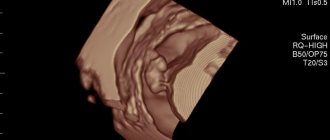The female body is quite complex, because it is entrusted with a responsible function - reproductive. A woman’s health is of utmost importance for conception and pregnancy. The proper functioning of the reproductive system is indicated by menstrual function. Every woman should know what signs of menstruation indicate their imminent onset.
Changes in the uterus and ovaries before menstruation
Changes in physical and mental well-being are the result of changes in hormonal levels in a woman’s body. Naturally, a woman can see and feel these changes, but colossal changes occur inside the body, inaccessible to the eyes.
Under the influence of hormones, the cervix changes its structure, becomes softer, moves down the vagina, and in nulliparous girls it may be slightly open. The uterus itself is elastic, ready for contractions during endometrial rejection. Before the onset of menstruation, the endometrium itself thins slightly from 2.0 cm to 1.7 cm.
Under the influence of hormones, the level of which changes sharply during the menstrual cycle, the ovaries can increase in size. This process is often accompanied by a slight nagging pain in the lower abdomen.
Causes of heavy discharge before menstruation
You need to understand that there are different reasons behind different types of secretions. The increase in the volume of healthy discharge before the onset of menstruation is explained by the peculiarity of the cycle: the body becomes more vulnerable, and in order to strengthen its protective functions, it secretes more secretions. However, if it has an unhealthy color, this may be a consequence of certain diseases. The most common is white pathological discharge with a characteristic odor and shades from yellow to greenish. They may appear in the background:
Signs of menstruation in a week
7-10 days before the start of the planned period, a woman notices significant changes in her health. They are commonly called premenstrual syndrome (PMS). Gynecologists say that normally women should not experience a sharp deterioration in their health in the period preceding MC. But practice shows the opposite; some symptoms already have folklore significance. You've probably heard the phrase, “What are you in the mood for, like a girl on her period?” Indeed, about a week before the onset of menstruation, a woman’s mood changes at the speed of sound. There has just been a manifestation of strong love and suddenly hatred appears. Fervent laughter gives way to crying. The desire to hug everyone is replaced by the desire to kill everyone.
Increased irritability and feelings of loneliness occur under the influence of the same sex hormones. After the start of menstruation, the signs of excessive nervousness will go away on their own. Around the same time, a woman notices a change in taste preferences, now she wants sweet, now sour, or even chocolate-covered herring. Such sudden changes are not considered a pathology and go away on their own, along with a change in the phases of the cycle. Physiological signs include swelling of the mammary glands, which also become more sensitive and painful on palpation. By the end of the working day, many women notice swelling in their legs and arms, which is also typical for premenstrual syndrome.
What are the symptoms before menstruation?
Frequent changes in mood, the appearance of headaches and pain in the back and lower back, as well as discomfort in the chest area may indicate that a woman is experiencing premenstrual syndrome. How many days it takes for PMS to set in and what symptoms it manifests itself in has not been precisely established by science. Everything is individual and depends on the woman’s health and general well-being.
Psychological symptoms of PMS:
- anxiety, irritability, tearfulness, feeling of depression;
- frequent and sudden mood changes;
- sleep problems - insomnia, constant awakenings at night, daytime sleepiness;
- loss of strength, lethargy and passivity;
- absent-mindedness, difficulty concentrating.
Physical symptoms of PMS:
- soreness of the mammary glands, an increase in their volume;
- swelling, sometimes quite noticeable;
- migraine or dizziness;
- nausea and vomiting;
- back and joint pain;
- thirst, which is accompanied by frequent urination;
- gastrointestinal disorders;
- attacks of rapid heartbeat, fever;
- the appearance of skin irritations;
- food cravings - mainly sweet and salty.
In most cases, signs of psycho-emotional and physical discomfort disappear after the first days of menstruation. If the symptoms manifest themselves clearly and often bother a woman, she should seek help from a gynecologist. Also, medical supervision is required for menstruation in adolescents, which are often accompanied by the appearance of dermatological problems (acne, acne) and disturbances in the functioning of the sweat glands (increased sweating).
General signs
It is quite difficult to identify a list of symptoms that appear by day of the cycle and indicate the imminent onset of menstruation, because the body of each woman is very individual. Below is a list of common signs that your period is coming soon.
Weight gain
Approximately 3-5 days before the start of MC, a woman’s body begins to retain water to thin the blood. During this period, body weight can increase by 1.5-2 kg for no reason, and also normalize on its own with the onset of discharge.
Irritability before menstruation
As mentioned above, excessive nervousness is associated with hormonal imbalance. Thus, high levels of estrogen are accompanied by the appearance of symptoms such as irritability, short temper, aggression and excessive pickiness about certain things. Increased production of the hormone progesterone is characterized by drowsiness, depression, and fatigue. When hormonal levels are normalized, these symptoms go away on their own without drug treatment.
Acne occurrence
Under the influence of progesterone during the premenstrual phase, the sebaceous glands of the skin actively produce sebum, which clogs the pores and leads to the appearance of a large number of acne. The favorite places for localization of rashes are the skin of the chin, forehead and nose.
The appearance of blood before menstruation
On the eve of menstruation, the cervix prepares for the release of bloody discharge and, under the influence of hormones, a small amount of mucus with blood can be released, which is brown in color and spotting in nature.
Headache
Many women experience intense headaches on the eve of menstruation, which are pulsating in nature and sometimes resemble a migraine. The reason for this is the same hormonal imbalance, water-salt imbalance and changes in blood pressure.
Frequent urination
Before menstruation, the uterus swells and becomes enlarged, involuntarily putting pressure on the organs of the urinary system. The urinary tract becomes very sensitive and reacts to pressure with a frequent urge to urinate. The same applies to the intestines; increased blood supply to the pelvic organs during menstruation is accompanied by frequent acts of defecation and urination.
How to distinguish PMS from pregnancy?
To distinguish PMS from pregnancy, you need to visit a gynecologist. Premenstrual syndrome, the symptoms of which vary from woman to woman, can resemble signs of early pregnancy and cause pain in the chest, frequent mood swings (attacks of sadness and apathy, tearfulness), and other ailments.
Pregnancy and PMS are caused by hormonal changes, so it's easy to confuse the two. If your bad mood persists for two weeks or more, seek medical help. According to the World Health Organization, doctors diagnosed mental disorders, in particular depression, in 10% of pregnant women.
Hormonal fluctuations are often the cause of female constipation, which can be aggravated by excessive consumption of confectionery, fatty foods, smoked foods and sweet soda. Research shows that constipation affects up to 38% of women, not only before menstruation, but also during pregnancy. In the first case, constipation most often appears against the background of intestinal diseases, the aggravation of which occurs under the influence of PMS, in the second - due to significant changes in the body due to the natural formation of the fetus, which is most often characteristic of the first two trimesters.
Common signs of PMS and pregnancy also include:
- changes in the breast, which may include pain, swelling, tenderness. With PMS, they are felt before the menstrual period, and disappear after it begins or ends. In the first months of pregnancy and before childbirth, the breasts become heavier, touching the area around the nipple can cause pain, and the veins located in the chest become more pronounced;
- fatigue. In some pregnant women, it is observed only during the first trimester, in others it persists throughout the entire 9 months until the onset of labor. Along with fatigue, a woman preparing to become a mother may periodically experience “menstrual” ailments, however, as a rule, they disappear within 1-2 days;
- bleeding. In early pregnancy, small blood stains may appear on your underwear. This is called implantation bleeding, which most often occurs 10 to 14 days after fertilization. Many women do not notice such discharge or confuse it with menstruation. You need to understand that menstrual bleeding lasts at least 4-7 days and causes significant blood loss, which is difficult to miss;
- spasms. In early pregnancy, they are similar to menstrual cramps and mostly occur in the lower stomach. In a pregnant woman, cramps may persist for several weeks or months (the reason is the development of the fetus in the womb).
PMS
All of the above symptoms are collected under one name - premenstrual syndrome. This diagnosis is not a pathology - it is the extreme limit of the normal functioning of the female reproductive system. The exception is the critical form of PMS. Signs of this pathology are severe headaches, accompanied by surges in blood pressure, loss of consciousness, shortness of breath and fear of death, and dyspepsia. This form of PMS requires urgent medical treatment, since women after such attacks become panicky about the onset of their period.
PMS forms
Doctors distinguish 4 forms of PMS that require medical supervision:
- Neuropsychic;
- Cephalgic;
- Edema;
- Critical.
Treatment of unpleasant symptoms before menstruation
After contacting a gynecologist, the doctor will conduct an examination and prescribe a set of diagnostic measures. Often, to treat PMS, it is enough to change a woman’s usual lifestyle:
- proper nutrition;
- practicing feasible sports;
- sufficient water intake;
- taking vitamin and mineral complexes;
- psychological support for loved ones.
In particularly advanced situations, medications may be used to eliminate premenstrual syndrome. The homeopathic medicine Remens and Mastodinon have proven themselves well, they normalize the hormonal levels of the female body, eliminate the symptoms of PMS, and also produce a slight calming effect.
To relieve nervous tension, it is advisable to take a course of sedatives of herbal origin 10-12 days before the planned menstruation. Valerian, Novo-pasit, Sedavit. To normalize ovarian function, gynecologists use vitamin E 400 mg, which effectively relieves PMS symptoms by normalizing the endocrine function of the ovaries. To relieve pain, painkillers are used: Ibuprofen, No-shpa, Tamipul, Analgin, Tempalgin, Spazmalgon. The choice of drugs to eliminate symptoms of the premenstrual period should be made by the leading gynecologist. Self-medication in this situation is unacceptable.
Early signs of pregnancy related to the endocrine and nervous system
Changes in the central nervous system are noticeable already at the early stage of pregnancy. So, the first signs of pregnancy before a missed period appear in:
- increased irritability, fatigue and drowsiness;
- intolerance to a number of odors, changes in taste, nausea and dizziness.
In the first case, the central nervous system turns on protective mechanisms that prevent the pregnant woman from becoming overly tired. The second group of signs is associated with a restructuring of the vagus nerve tone.
The endocrine system is involved in the pregnancy process even before fertilization.
The correct functioning of the hypothalamus, pituitary gland and ovaries influence the preparation of the woman’s reproductive system for fertilization and are responsible for the development of the egg. Visually, hormonal changes can manifest themselves in skin pigmentation or changes in the facial contours of the expectant mother.
Useful video: how to determine that you are pregnant before a delay?
If the expectant mother wants the pregnancy to proceed without complications, then it is in her interests to be aware of the “interesting situation” as early as possible. Most women have no idea that they are expecting a baby until their period is missed. She continues to lead her normal rhythm of life, which may include excessive physical initiative, use of alcohol or drugs, and stressful situations. All this can have a detrimental effect on the pregnancy process. Therefore, knowing the first signs of pregnancy even before a missed period is very important. The following video will help you sort through the knowledge you have acquired and discover the source of a new life at an early stage.
Useful articles on the topic:
Ectopic pregnancy: symptoms in the early stages What medications can pregnant women take for headaches? Signs of a frozen pregnancy in the first and second trimester How to treat a cold during pregnancy in the 1st trimester?
This article has been verified by Olga Zorina, a current qualified physician, and can be considered a reliable source of information for site users.
Rate how helpful this article was
5 16 people voted, average rating 5
Did you like the article? Save it to your wall so you don’t lose it!









